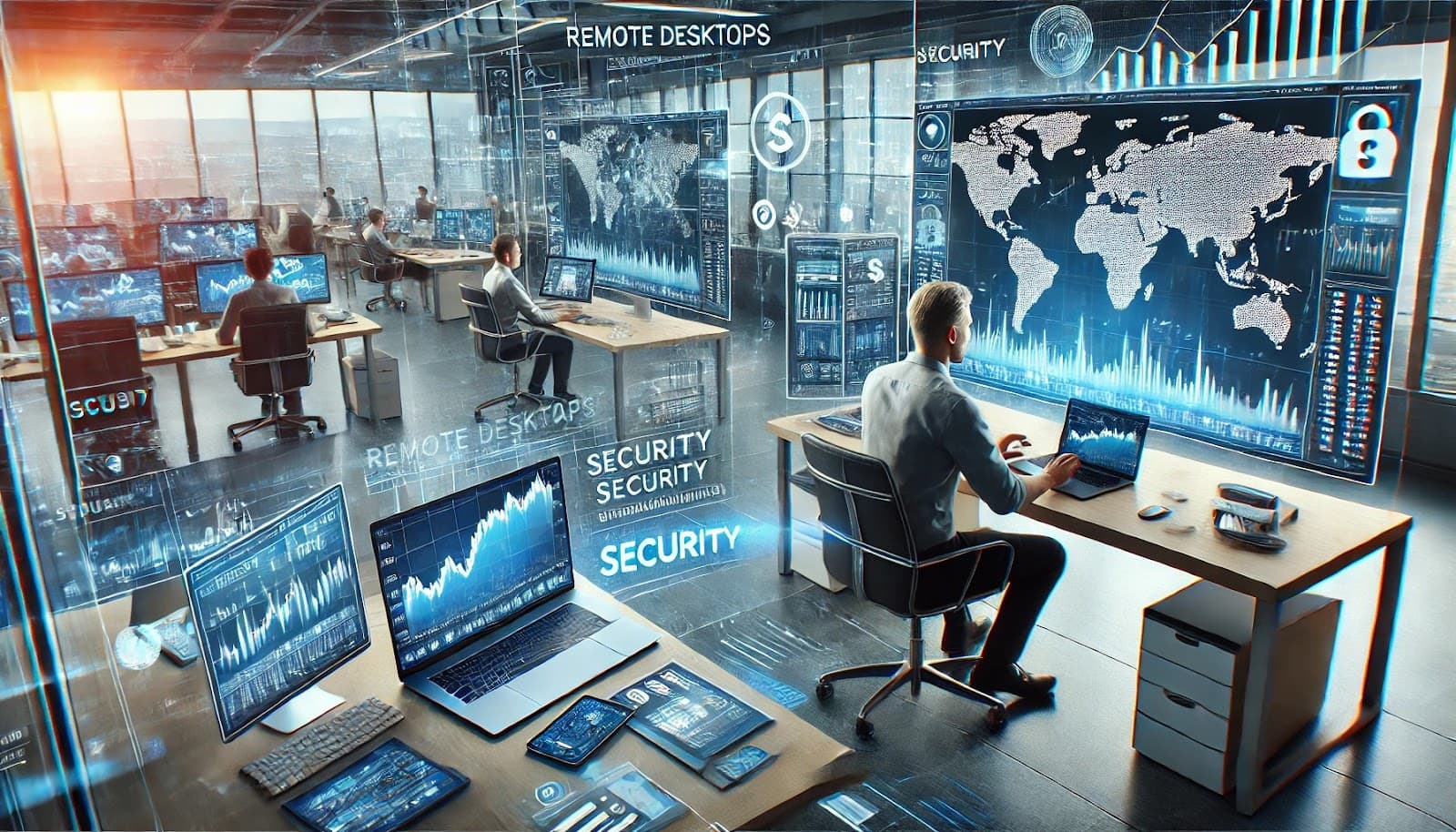Why Remote Desktops Are Essential for Forex Traders and Brokers

Remote desktops have become an essential tool for Forex traders and brokers, offering significant advantages in terms of accessibility, security, and performance. Forex trading operates around the clock, and being able to access trading platforms from any location is crucial for both traders and brokers. Remote desktops allow users to connect to their trading systems securely, enabling them to monitor and execute trades without being tied to a specific physical location. This is particularly beneficial for those trading in global markets where different time zones play a major role. By accessing platforms such as Exness MetaTrader 5 remotely, traders can manage their portfolios, analyze the market, and execute trades seamlessly from anywhere, enhancing both their productivity and profitability.
In addition to mobility, remote desktops offer enhanced security features, which are critical when handling sensitive financial data. Forex traders deal with substantial amounts of money and personal information, making data protection a top priority. Remote desktop solutions provide robust security protocols such as end-to-end encryption, multi-factor authentication, and regular backups to ensure that all data remains secure. For brokers, the ability to centralize their trading operations on secure servers reduces the risk of unauthorized access and data breaches. Platforms like MetaTrader 5 benefit from remote desktop access by offering brokers a reliable environment to execute large-volume trades, monitor client activities, and ensure that all operations run smoothly and securely, even in high-pressure scenarios.
What is a Remote Desktop
A remote desktop is a technology that allows a user to access and control a computer or server from a distant location, typically over the internet. It enables the user to operate a computer as though they were sitting right in front of it, even though they are physically far away. The user’s local device (such as a laptop, tablet, or smartphone) connects to the remote computer, which runs its operating system and software, allowing them to use applications, manage files, and perform tasks just like they would on their own device.
This setup is commonly used by businesses and individuals to work from different locations, providing flexibility and convenience. Remote desktops also offer enhanced security features, such as encryption and multi-factor authentication, to protect sensitive data. Additionally, remote desktop services are widely used in industries where access to high-performance computing is necessary, such as for Forex traders who need to ensure their trading platforms are accessible at all times without being restricted by physical hardware limitations.
How Forex Traders and Brokers Using Remote Desktops
Remote desktops provide Forex traders and brokers with secure, flexible, and efficient access to their trading platforms, improving performance and risk management.
Enhanced Accessibility for Traders
Forex traders use remote desktops to access their trading platforms, such as MetaTrader 4 or MetaTrader 5, from any location with an internet connection. This flexibility allows them to monitor market conditions, place trades, and analyze data in real time without being tied to a specific computer or office. Traders can stay connected 24/7, ensuring they don’t miss trading opportunities, even when traveling or working remotely. The ability to use any device, including laptops, tablets, or smartphones, makes Forex trading more accessible and efficient.
Centralized and Secure Environment for Brokers
For brokers, remote desktops provide a secure and centralized platform to manage multiple client accounts and handle large trade volumes. Brokers can remotely access their trading infrastructure, monitor client activities, and maintain high levels of service. Additionally, remote desktops help reduce hardware and maintenance costs by relying on centralized servers to run trading software.
Improved Security and Risk Management
Remote desktops enhance security by implementing encryption, multi-factor authentication, and access controls to protect sensitive trading data. These security features reduce the risk of data breaches or unauthorized access, ensuring compliance with industry regulations. By using remote desktops, traders and brokers can operate with greater confidence, knowing their data and trading platforms are protected.
Cost Efficiency and Operational Stability
By shifting to remote desktop solutions, brokers and traders can minimize expenses related to hardware upgrades and IT maintenance. Centralized management reduces downtime and improves overall system stability, allowing for a seamless trading experience. This efficiency not only improves performance but also contributes to a more reliable trading environment.

How Remote Desktops Improve Risk Management
Remote desktops play a crucial role in improving risk management for Forex traders and brokers by offering enhanced security features, centralized control, and data protection. One of the primary ways remote desktops enhance risk management is through robust security protocols. Data transmission between the local device and the remote system is typically encrypted, ensuring that sensitive information, such as trading data and personal details, is protected from potential cyber threats. Multi-factor authentication further strengthens security by requiring more than just a password to gain access, reducing the risk of unauthorized access to trading accounts or platforms. With these added layers of security, traders and brokers can manage their operations with greater confidence, knowing their data is safeguarded from breaches.
In addition to security, remote desktops allow for centralized control and monitoring of trading activities, which helps reduce operational risks. Brokers and traders can track trades, manage multiple accounts, and monitor market conditions from a single, secure platform. Centralized access to all data and systems makes it easier to implement timely backup and recovery plans, ensuring minimal downtime in case of technical failures. Moreover, remote desktops enable better control over who can access the trading environment, allowing businesses to enforce strict access restrictions. This level of control over the trading infrastructure minimizes human error and the risk of internal fraud, making it easier to maintain a secure, efficient, and reliable trading operation.
Benefits of Remote Desktops for Forex Traders and Brokers
Remote desktops offer a wide range of benefits for Forex traders and brokers, making them an essential tool for improving trading efficiency, security, and overall performance.
- 24/7 Accessibility: Remote desktops allow traders and brokers to access their trading platforms from any location, at any time. Whether at home, in the office, or while traveling, traders can monitor market movements and execute trades without being tied to a specific computer. This is especially valuable in Forex trading, which operates 24 hours a day, across different time zones.
- Enhanced Security: Security is a top priority in the Forex market, and remote desktops offer robust protection features. With encrypted connections, multi-factor authentication, and centralized data storage, remote desktops significantly reduce the risk of data breaches or unauthorized access. Traders and brokers can be assured that their sensitive financial data and trading strategies are kept secure, even when accessing their platforms from various devices.
- Improved Performance and Speed: Remote desktops provide high-performance computing resources that can enhance the speed and efficiency of trading operations. They offer faster execution of trades, especially for those who rely on complex strategies and require real-time data analysis. With a remote desktop, traders can bypass the limitations of their local devices, ensuring seamless and swift access to trading platforms.
- Reduced Downtime: Remote desktops typically offer more stable and reliable environments than local computers. They are hosted on powerful servers, ensuring that traders can continue their activities even in the event of a local device failure or internet disruption. Additionally, brokers can use remote desktops to ensure their platforms are constantly running, minimizing downtime and maintaining a smooth trading experience for clients.
- Centralized Control for Brokers: For brokers, remote desktops provide the advantage of centralized management. Brokers can monitor multiple accounts, manage client transactions, and oversee their platforms from a single location. This not only increases operational efficiency but also ensures a more consistent and responsive experience for clients, as brokers can easily access and manage all necessary data remotely.
- Cost Efficiency: By leveraging remote desktops, Forex traders and brokers can reduce the costs associated with maintaining physical infrastructure and devices. There is less need for upgrading local hardware, as the remote desktop environment handles resource-intensive tasks. For brokers, this means fewer costs related to IT support, hardware maintenance, and software updates.
- Scalability: Remote desktop solutions are highly scalable, allowing brokers and traders to easily increase their computing capacity as their business grows. Whether adding more users, expanding trading operations, or accessing more resources, remote desktops can be quickly adjusted to meet evolving needs without significant additional costs.
Conclusion
Remote desktops have become a vital tool for Forex traders and brokers, offering unparalleled flexibility and security. These solutions allow traders to access their trading platforms from anywhere in the world, ensuring that they never miss an opportunity in the fast-moving Forex market. With features like 24/7 accessibility, traders can monitor the market, place trades, and analyze data at any time, regardless of location. This level of mobility is crucial for Forex traders who operate in global markets across different time zones. Additionally, remote desktops help brokers maintain centralized control over their operations, managing client accounts and monitoring trades securely from a single platform.
Beyond accessibility, remote desktops also provide enhanced security, which is critical when dealing with sensitive financial data. With encrypted connections and multi-factor authentication, remote desktops significantly reduce the risk of unauthorized access or data breaches. For brokers, remote desktop solutions allow for streamlined management of trading platforms, reducing operational costs associated with physical infrastructure and IT maintenance. The ability to scale resources easily and maintain high levels of performance further solidifies remote desktops as an essential tool in the Forex industry. Ultimately, remote desktops improve both risk management and operational efficiency, making them indispensable for traders and brokers who seek a secure and flexible trading environment.